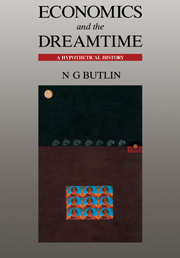Book contents
- Frontmatter
- Contents
- Preface
- Acknowledgements
- Figures
- Maps
- Tables
- Introduction
- Part I The palaeoeconomic history of Aboriginal migration
- Part II Development, structure and function of Aboriginal economy
- 7 Introduction
- 8 The process of early settlement
- 9 Variety in the precontact Aboriginal economy
- 10 The nature and function of Aboriginal economy
- 11 Dynamic elements in the Aboriginal economy
- Part III Disease, economics and demography
- Part IV The establishment of a bridgehead economy: 1788–1810
- Part V The takeover process: 1788–1850
- Bibliography
- Appendix 1 Preliminary model/checklist of Aboriginal migration to Australia
- Appendix 2 NOAA depth contour maps
- Index
11 - Dynamic elements in the Aboriginal economy
Published online by Cambridge University Press: 06 July 2010
- Frontmatter
- Contents
- Preface
- Acknowledgements
- Figures
- Maps
- Tables
- Introduction
- Part I The palaeoeconomic history of Aboriginal migration
- Part II Development, structure and function of Aboriginal economy
- 7 Introduction
- 8 The process of early settlement
- 9 Variety in the precontact Aboriginal economy
- 10 The nature and function of Aboriginal economy
- 11 Dynamic elements in the Aboriginal economy
- Part III Disease, economics and demography
- Part IV The establishment of a bridgehead economy: 1788–1810
- Part V The takeover process: 1788–1850
- Bibliography
- Appendix 1 Preliminary model/checklist of Aboriginal migration to Australia
- Appendix 2 NOAA depth contour maps
- Index
Summary
So far, emphasis has been placed on some of the major aspects of so-called ‘traditional’ behaviour. There are many qualifications and some other matters that might have been discussed. In the available space it is necessary to concentrate on a different issue, the dynamic elements in Aboriginal economy. Some fall within the limits of what might be regarded as a ‘static’ economy (and there is a fine dividing line between what one might mean by ‘static’ and ‘dynamic’); others would suggest the possibility of change in one or all of three senses — structural change; increase in real income per head; increase in aggregate output and population (including increased densities per land unit).
Intergenerational transfers
Intergenerational transfer of knowledge depends on increasing the understanding of new recruits in generational terms, so maintaining human capital intact requires some dynamic action. An existing generation must run faster so that, relative to it, a succeeding generation can stand still. This encompasses more than just the productive activities of hunting and gathering or even of resource management. The intergenerational transfer of ritual and myth, both lore and law, is vital. These are important issues that Possner's otherwise very valuable contribution omits.
If the maintenance of human capital is a matter that needs to be added to concepts of hunting and gathering, so does learning by doing for an existing generation. This learning by doing may be important in seasonal adaptations, and even in moving between well known areas; seasonal characteristics change and with them the specifics of production possibilities.
- Type
- Chapter
- Information
- Economics and the DreamtimeA Hypothetical History, pp. 87 - 96Publisher: Cambridge University PressPrint publication year: 1993



